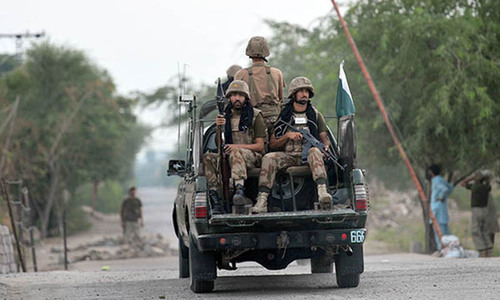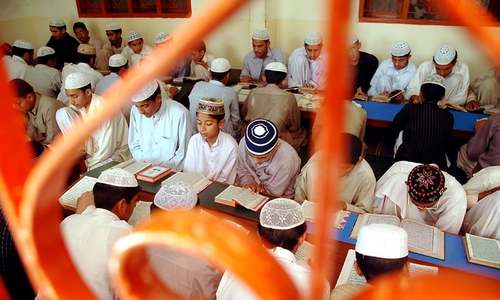THE reported upsurge in the TTP’s terrorist violence in Pakistan in recent months has coincided with the Afghan Taliban’s takeover of Afghanistan in August. While there are fears of a further escalation in terrorist violence, the real challenge lies in the persisting shades of religious extremism which have the potential to complicate the country’s security and political landscape.
The Afghan situation will have multiple implications for Pakistan in terms of insecurity and militancy, cross-border terrorism, refugees’ influx, and economic instability. That is what makes it imperative for Pakistan to continue supporting the Afghan peace process through influencing the Afghan Taliban to enter intra-Afghan negotiations and work towards the formation of an inclusive government. Although Pakistan is confident it can deal with the possible fallout of the Afghan conflict in terms of security and violence, an unstable and violence-prone Afghanistan will certainly encourage violent radical and extremist narratives and movements in Pakistan, which will not be easy to deal with.
Read: Pakistan side of Afghan border is secure, emphasises DG ISPR
Pakistan’s religious landscape is fertile for radical ideologies. As the moderates struggle to make themselves relevant in society, the clergy declares them ‘innovators’ or biddati, who, they say, reject the traditional tenets of the religion. The clergy in Pakistan is largely literalist in its understanding of religion and takes pride in being the so-called custodian of tradition. A literalist mind sees the world through very narrow lenses. Although such a mindset is not healthy for the legal, jurisprudential and academic discourse of religion, more worryingly when it becomes a political stakeholder it tends to absorb radical tendencies easily.
Pakistan’s religious landscape is fertile for radical ideologies.
The Afghan Taliban are literalists too, and continue to inspire like-minded militant and religious political actors especially in Pakistan. This is happening across the sectarian divide. The Taliban victory has apparently made them a role model for Deobandi, Barelvi, Ahle Hadith, and even Shia religio-political parties. One must recall the happenings of the late 1990s to understand how the Taliban were then inspiring religious groups in Pakistan. Following in the Taliban’s footsteps, a banned sectarian outfit Sipah-i-Sahaba launched a campaign to enforce Sharia rule in district Jhang. The Jamiat Ulema-i-Islam and Jamaat-i-Islami had adopted aggressive and threatening postures. A movement for the enforcement of the Sharia began in certain tribal agencies. A religious leader from district Chakwal had announced a ‘death or Sharia’ campaign and started a march towards Islamabad. Jihadi groups were glorifying militancy on campuses and in the streets. The banned Jamaatud Dawa was running a successful campaign on media. Local ‘Sharia courts’ mushroomed with militant groups providing ‘speedy justice’ to the people. Then 9/11 happened.
One can argue that the situation is completely different now: the militants are not on the horizon; the state has eliminated ungoverned spaces; and sectarian groups are under control. But what is important to note is that radical and extremist tendencies persist in religious segments. Certain groups may have been weakened, but their ideology is still nurturing toxic narratives in society. The clergy still controls a vast network of religious schools and generates financial resources to further expand the madressah network, apart from cultivating a political support base.
One institution and one issue will continue haunting the security establishment in the country. The institution is that of the madressah, which has undergone a huge transformation over the last 20 years. The issue is that of ‘blasphemy’ which multiple religious actors will continue to exploit in order to gain power and keep the pressure on the state and state functionaries. The madressah provides ideological, logistical, and political support to like-minded political and powerful state actors.
However, a sense of resentment is increasing among madressah graduates, because of market dynamics. Not every madressah graduate can be accommodated in a mosque or madressah. The formal education sector is their top priority, where they have bagged a major job share, but the number of graduates is increasing, and the education sector cannot employ them all. On the other hand, the religious elite, which comprises the leaderships of madressahs, religious groups and religio-political parties, is getting richer and is influential in social and political domains. This paradoxical trend is triggering anti-establishment sentiments among the new madressah generations. The Taliban takeover emerges as an alternative model for them to vent their anger.
Read: Madressah reforms — Breaking the cycle
The religious leadership has created an impression that the state institutions are under the influence of foreign forces and secular lobbies and have compromised on the issue of protection of the honour of the Prophet (PBUH). Though the prime minister and the heads of other institutions have raised this issue on several international forums and are trying to sensitise it at various levels, these attempts haven’t proved fruitful and religious groups, particularly the banned Tehreek-i-Labbaik Pakistan remain suspicious about such efforts. The TLP and similar groups think that a Taliban-style government can force the international community to take strict action against the blasphemous attempts of individuals.
The Taliban victory has increased the confidence of religious groups and encouraged the madressah generations. Any blasphemous act anywhere can trigger anger both in Afghanistan and Pakistan. The Taliban want to consolidate their rule and they will exploit it to the maximum extent. The religious groups in Pakistan will be more aggressive and will follow what the Taliban do in Afghanistan.
State institutions are discussing the issue and may be worried about the implications of the Taliban victory for Pakistan. However, any plan to deal with the situation is still missing. But till now the state has been tolerating the group for many years overlooking domestic and international concerns. The disadvantage of the approach is that religious groups seek legitimacy and political power through such responses. On the other hand, state institutions have been harping on the same argument of ‘narratives’ and ‘counter-narratives’ without offering a real-world solution to problems related to extremism.
A critical challenge is emerging ahead and the Afghan Taliban’s white flags, which were raised at Jamia Hafsa recently in the federal capital, were just one sign of the danger ahead.
The writer is a security analyst.
Published in Dawn, October 3rd, 2021














































